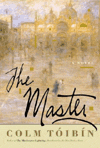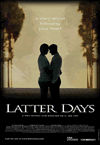 Our
man from England, Tony Heyes Our
man from England, Tony Heyes  reviews two books this issue:
reviews two books this issue:The Master by Colm Toibin & Latter Days - adapted from the screenplay of C. Jay Cox by T. Fabris |
 The Master by Colm Toibin The Master by Colm ToibinHardcover: 352 pages Publisher: Scribner; (June 2, 2004) ISBN: 0743250400 also Published by Picador 2004-04-28 ISBN: 0330485652 As Henry James grew older his books sold fewer and fewer. He consoled himself with the thought that he was unable to write down for the mass market. Others might produce potboilers for the semi-literate: he practised the “Fictive Art”. Despite this, part of him yearned for universal recognition and acclaim. Having failed with his novels and stories to achieve such popularity he sought it on the stage, writing the singularly undramatic “Guy Domville”. Appearing at a time when the glittering comedies of Wilde were the talk of the town, this earnest tale of a man called upon to give up his vocation as a priest in order to continue the family line could not help but suffer from the comparison. Lacking obvious drama, it was a dismal failure and James was booed on the stage on the opening night. Colm Toibin takes this incident as the opening of his new novel, “The Master”, which covers five years in the life of James. Readers of his two previous novels, “The Story of the Night” and “The Blackwater Lightship”, will know that Mr. Toibin is not big on hilarity, nor even the wry smile. He is what Bertie Wooster would refer to as a “doomy bird”. His latest production is light on humour too. What it lacks in humour, however, it more than makes up for in psychological penetration and craftsmanship. Mr. Toibin’s book is an admirably imaginative attempt to get into the mind of Henry James. The facts of Henry James exterior life are well known but he was famously reticent about his inner life. Few of his friends were acquainted with it and such evidence about it as might have come down to us was destroyed by James towards the end of his life in a series of bonfires of his correspondence. Much has, therefore, to be inferred from what we do know of his life and from the clues contained in his works of fiction. As a novelist James laboured under two big handicaps; he shunned intimacy and his sexual inclination, if any, was towards his own sex. This made his treatment of the relationship between the sexes, the mainstay of the nineteenth-century novel, problematical. He had to rely on imagination and observation rather than experience to deal with such relationships. In many of his novels he succeeds in hiding the emotional void at the core of his novels with an elaborate buttressing of metaphors and similes. Remove this and the tales become almost laughably simplistic. Even his most accessible novel, “The Portrait of a Lady”, can be seen as little more than a fairy tale. Isabel Archer has to choose, like Princess Aurora in the Rose Adagio, amongst a number of suitors. Unlike the Princess she does not reject them until her Prince (ideally danced by the incomparable Manuel Legris) comes onto the scene; instead she is manipulated into marrying the least suitable and lives out her life in self-inflicted misery. James’s skill as a writer hides the emotional absurdity of his scenario but as he grew older his material got thinner and his efforts to beef it up more elaborate. One reads James now to admire his literary skills and to divine what he was obliged to omit rather than what he included. Too many of his characters seem like disembodied intellects, dead from the waist down. Mr. Toibin deals sympathetically with James’s dilemma. Although his book deals ostensibly with the outward events of five years in James’s life, in reality it ranges throughout his entire life. His mind is seen to wander back and forth in time and space, back to his childhood and to the various countries in which he has lived or vacationed. His various friends and relations and their lives, too, are considered, as is the use he made of other people’s experiences in constructing his fictions. Mr. Toibin has clearly researched James’s life very carefully. More to the point, he has managed to sift his material and mould it into the tragic tale of a life half-lived. James’s injunction to “live all you can” was born of a lifetime of observing from the sidelines. Although this book is a slow read, requiring the careful assimilation of long descriptive passages, it results in an absorbing and credible interpretation of one of America’s greatest authors. Mr Toibin’s James is a warmer, less timid individual than he seems in many of the lives written about him and as such gives the reader much food for thought. This book is not a rattling good read; rather, it is a ruminative exploration of the mind of an author: not an airport book but one for the long evenings. One reads it as much to appreciate the writing as to find out what happens next. Indeed, most readers will know what happens next. Mr. Toibin’s skill lies in giving believable explanations of why. Tony Heyes |
 Latter Days adapted from the
screenplay of C. Jay Cox by T. Fabris Latter Days adapted from the
screenplay of C. Jay Cox by T. FabrisPublished by Alyson Books 2004 ISBN: 1-55583-868-5 Latter Days is by all accounts a pipperino of a film. However, readers buying this book on the assumption that the film is based on it should be warned: it is not. The book derives from the film and has certain weaknesses as a result. The plot line is simple enough. Four Mormon missionaries move to Los Angeles. One of them is a closeted gay man. Two of their neighbours are room mates, a black female singer, Julie, and a very out gay man, Christian. The gay man’s friends bet him $50.00 that he can’t seduce one of the missionaries. He has already singled out one of the missionaries, Aaron, as “cute” and gay. He makes a move on him. The young man eventually responds and is sent back home in disgrace, one of his fellow room mates having seen him kissing Christian. Kissing is all they have done so far. (One is reminded of the Gracie Fields song “Is it worth just a kiss to be landed like this?”) Christian pursues him as far as Salt Lake City where they consummate their relationship between flights then go their separate ways. Aaron returns to his native city a pariah. His mother conceals a message Christian has sent him. He feels abandoned and after attempting suicide enters an institution to be sexually reoriented. Christian, meantime, has been led by Aaron’s mother to believe that Aaron is dead and undergoes a radical change of outlook, abandoning his hedonistic lifestyle for something more worthy. Eventually, by accident, Aaron becomes aware that Christian did not abandon him and seeks him out. They are reunited. Finis. Film can show what novels describe. Unfortunately the book of Latter Days is not a novel in the fullest sense of the word since it does not fill in the gaps that are perhaps not readily apparent in the film. The main problem is Christian. At the beginning of the book he is a completely two-dimensional airhead. We are given no clue as to his thought processes (if any) and Aaron’s attraction to him remains a mystery since Aaron is clearly a thoughtful, bright and intuitive young man who would surely believe that looks aren’t everything. We are given only one biographical detail of Christian’s previous life, whereas Aaron is much more fully presented. As the book progresses it improves. Christian begins to redeem himself by thinking more of other less fortunate than himself. Aaron’s remarks provoke him into the beginnings of the examined life. The demands of Mormonism and its world view are presented and explored, its tyranny of minorities being a wonder to behold. Why is it that people who have fled persecution or sought a better life have no hesitation in pulling the ladder up behind them and doing unto others what they didn’t like having done unto them? (Answers on a post card please, to Salt Lake City). All in all, this proved to be an enjoyable and enlightening book despite its inadequacies with regard to Christian. I look forward to the film’s release on DVD with anticipation. —Tony Heyes |